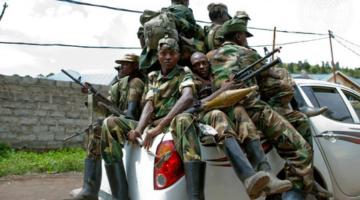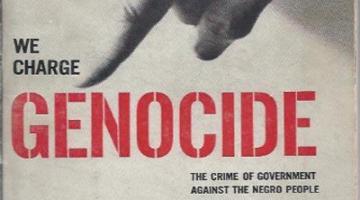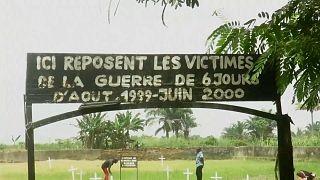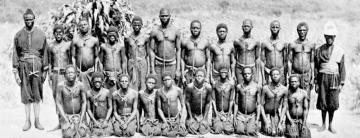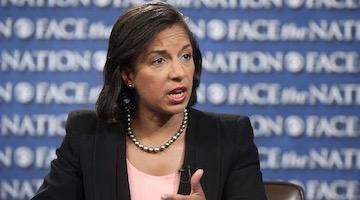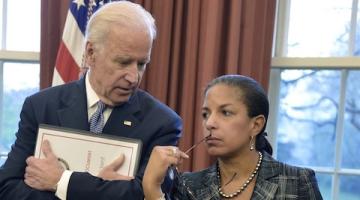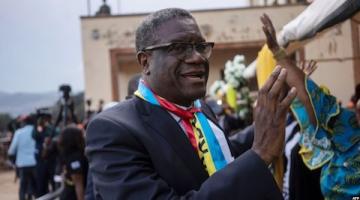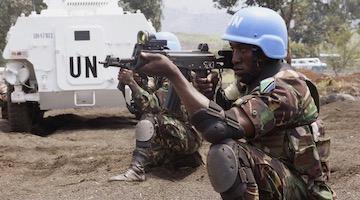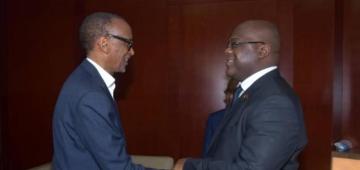The imperial aggressions of western governments have inflicted multiple holocausts on the Congolese people.
“In Congo, globalized capitalism creates permanent chaos.”
This week I spoke to Swiss Congolese historian, activist and coordinator of the Congolese movement Likambo Ya Mabele Bénédicte Kumbi Ndjoko about recent developments in the Democratic Republic of the Congo.
Ann Garrison: On February 12, 2018, the UN High Commissioner for Refugees reported that there were 4.49 million internally displaced persons (IDPs) in the Democratic Republic of Congo, and 630,500 refugees in neighboring countries. The IDP population had nearly doubled in the previous year alone, mainly as a result of clashes and armed attacks. It sounds like conditions on the ground in Congo are getting worse, much worse.
Bénédicte Kumbi Ndjoko: Congo is indeed in a critical situation. We know how much its people have suffered since the genocides in Rwanda and all the displacement they caused, then by the wars that Rwanda and Uganda waged against Congo from 1996 to 1997 and then from 1998 to 2003, with the support of the US, UK, and their allies. Today some observers speak of Congo as a post-conflict country, but it’s still in a low-intensity conflict, off and on, hot and cold. A conflict that drags on like this can become even deadlier than declared war, as it has in the North and South Kivu Provinces bordering Rwanda, Uganda, and Burundi. More than a million of the 4.49 million internally displaced people are in North Kivu Province.
In the past two years the situation has also deteriorated in the Kasai region, where people are being exterminated or displaced to Angola. There has also been an increase in attacks against the populations of the former Katanga Province, which was split into the Tanganyika, Haut-Lomami, Lualaba and Haut-Katanga Provinces in 2015. Congo and its people are not on the brink of the abyss, they have long since fallen into it.
“People are being exterminated in the Kasai region or displaced to Angola.”
AG: It’s hard to know what to say about so much suffering. What would you most like to say about it here?
BKN: Suffering should inspire compassion, but compassion should inspire reflection. Is the person who looks at a suffering human being able to ask himself if he is not involved in one way or another in the suffering of the individual in front of him? Can he or she grasp the causes of the crimes perpetrated against that human being and the political implications that arise from these acts? If we stop at the suffering of the Congolese people, we won’t be able to address its particularities and causes. It will be no different than the depressing and fatalistic images that have shaped the image of Africa in people’s minds. We must examine Western governments' imperial aggression against Congo and Africa as a whole.
AG: Dr. Denis Mukwege, the Congolese gynecologist who became known as “the man who heals women” for treating the victims of brutal rape in eastern Congo, finally won the Nobel Peace Prize this year. Does that give you any hope?
BKN: I had the opportunity to meet Dr. Mukwege in person. I saw this man with women from all over the world who had all been raped during conflicts. They came from Congo, Rwanda, Sudan, Syria, and Iraq. I could see how this man spoke to these women, the concern he had for them and his way of telling them that their word counted. He has all my admiration.
That said, it seems to me that there is also something cynical about presenting him with the Nobel Peace Prize. It’s an organized, staged reality that obliterates the imperial aggression in Congo and encourages a global consensus to stop the rapes but continue the war. It makes the Western Nobel Peace Prize audience feel good about themselves and their compassionate response to the victims of African savagery. This was reinforced by Nadia Murad, the Iraqi rape survivor who shared this year’s Peace Prize with Dr. Mukwege. She said that she would continue as a global advocate for victims of rape and torture, and for persecuted minorities, like the Kurdish Yazidi minority she belongs to.
“The Nobel Peace Prize encourages a global consensus to stop the rapes but continue the war.”
The deeply political discourse imposed by the Nobel Committee is intended to bolster, not disturb, the dominant order. It is part of the Western will to write official history, where the important thing is constructing a discourse on the woman, on the brutalities she has to suffer. It’s a discourse wholly accepted in Western societies because of the feminist struggles. In this discourse, Dr. Mukwege is the man of an inter-world, a Black man who is meant to become white. He is like the white man who knows how to defend the rights of women against the barbarism of uncivilized men—Black in this case—who are essentially defined by their savagery.
AG: Male rape is also a weapon of war in Congo and elsewhere. It’s rarely reported, though it was given some attention in “The Nobel committee shines a spotlight on rape in conflict,” an October 11 “Economist” report that said it’s hard to estimate its frequency because so many men fear to report it because they’re so humiliated and may fear being accused of the crime of homosexuality. Uganda’s Refugee Law Project explained this profoundly in their film Gender Against Men, which I recommend to anyone reading this. The rape of both men and women as a weapon to destroy community makes it more clear that there is an ongoing genocide against the Congolese people, not just “femicide.” Could you talk about how the singular focus on violence against women hides that?
BKN: I have always been disturbed by the speech of Margaret Wallström, the former UN Special Envoy for violence against women and children in conflict. In 2010, after a stay in Congo, she claimed that this country was the rape capital of the world, and urged the Security Council to act to stop it. This statement associated the crime of rape with a specific nation, Congo, and with all the male individuals within. The word “capital” typically refers to the most central location, the brain and heart of a nation, the carrier of the cultural values. So one of Congo’s cultural values would be rape?
This perception of a pathological Congolese society filled with male rapists is also shared by a lot of Western women who campaign for Congolese women, like Eve Ensler. They even go so far as to call what is happening in Congo a femicide, a war against women. This portrays the Congolese male as an atavistic rapist.
“The perception of a pathological Congolese society filled with male rapists is also shared by a lot of Western women who campaign for Congolese women.”
The extreme focus on Congolese women’s bodies is not intended to defend them but is part of a broader discourse on the savagery of Congolese men and Black African male populations in general. Congo is the world capital of rape. Congo is the capital of a savage nation in the heart of Black Africa where Congolese men rape women to destroy them. Who could regret seeing such a deviant society cleared off the face of the earth?
UN envoy Margaret Wallström didn’t call for an end to the imperialist war waged against Congo and Africa in general. She said nothing about the imperial powers who commissioned the war crimes, including rape, against the Congolese people. She did not call on the Security Council to establish a tribunal to prosecute the crimes that were evidenced in the 2010 UN Mapping Report on Human Rights Abuse in the Democratic Republic of the Congo, 1993-2003, which revealed most significantly the crimes of longstanding US ally Rwanda. Instead, she called Congo the rape capital of the world and called on the Security Council to intervene against savage Congolese men.
AG: Some people have proposed that Dr. Mukwege, the most internationally recognized moral authority in Congo, should head a transitional government there. They include our mutual friends Patrick Mbecko and Jean-Claude Maswana, both of whom are highly respected Congolese scholars and activists. What do you think of that idea, and how do you imagine “transitional government” in Congo?
BKN: The fact is that I often wonder what people mean when they say that they want a transitional government. I'm sure that our friends Patrick Mbeko and Jean-Claude Maswana have very specific ideas on what it means, but when I read many other Congolese on “transition,” it seems that this is a kind of magic bag that would help us get rid of President Joseph Kabila, his troops, and the Rwandan occupiers. It does not in any way address, for example, the problem of neocolonialism or the case of the so-called Congolese opposition. The latter are, in my opinion, people who must be removed from the political sphere in Congo. They have flagrantly participated in sustaining Kabila’s tyrannical reign, even when the so-called constitution didn’t allow him to stay in power anymore. In addition, they never had the courage to explain to the population what role Rwanda and Uganda were playing in Congo’s tragedy. Are we going to include them in that transitional government? The transition presented this way has no appeal to me, even if it is led by Dr. Mukwege.
“Only a deep and radical rupture would give us the possibility of rebuilding the Congo state.”
I instead subscribe to the thought of another of my friends, Father Jean-Pierre Mbelu. For him, we cannot speak of transitional government in Congo, because it presupposes that there has been a form of democracy that should be restored after a period of crisis. The problem of Congo, however, cannot be summed up by a political crisis. The country is rather subjected to a permanent coup d'etat, and only a deep and radical rupture would give us the possibility of rebuilding the Congo state.Calling for transitions has been the solution that the international community has wanted to systematize in several African countries, including Congo, but its results leave much to be desired. The transition away from Kabila puts, in my opinion, too much weight on Kabila. It does not insist enough on revealing who created Kabila and does not inform us on the type of government and society we want to build after Kabila.
AG: Liberal Democrats and even leftists in the US are now so horrified by Donald Trump that our politics have been largely reduced to pro- and anti-Trump politics. You have the same problem regarding Kabila in Congo, don’t you?
BKN: Yes, and it is an eminently dangerous position because it means in fact no choice. It is an enclosure in a dichotomous circle that does not allow any escape or possibility to imagine other systems than the ones that exist. In this case, we are in the middle of a democratic illusion. Democracy according to this meaning is the right to be for or against. It is the right to change between two sides of the same coin while the ideology that creates the coin remains unchanged. This refers to the fundamental problem posed by capitalism. It is indeed a system that organizes a non-choice, that creates the illusion of choice for the benefit of the oligarchies that rule us. The tragedy of countries like ours is that they run after what they believe to be democracy, a binary system where it is only possible to be pro- or anti-X. It is even sadder because we’ve forgotten that this binary system never existed on the African continent prior to colonization but forms of real democracy did, especially in the Kongo Kingdom.
AG: Kabila should go, as Trump should, but what other forms of organizing are needed to alleviate the suffering and put Congolese on a path to claim their country’s enormous wealth and potential?
BKN: If we think about change, we need to understand that we all live within the context of globalized capitalism. We need also to understand that capitalism appears in different shapes and forms according to the space it is targeting. In Congo, it creates permanent chaos so as to maintain people in that chaos, with no boundaries to the violence because the state exists only as the most minimal simulacra of Western institutions. These are the prerequisites for plundering the country, draining it of its minerals and other natural resources, some of which have been declared strategic for US security. It not only kills and displaces Congolese but also dismantles their communities and so disorients them that they are unable to understand the global capitalist world and the role that Congo is relegated to within it. It all but eliminates their capacity to defend themselves. One must understand and broaden the understanding of this to fight back effectively and bring about change.
The individual alone, even if he or she understands what is at stake, cannot change anything, but Congo is hammered again and again with the idea that only an individual can change the course of events, so people are waiting for that particular individual. It is therefore not surprising to see the extreme focus on who will be the next president. That focus is fundamentally disorientating. It is a key element of the collaboration between the national comprador class and the imperialists, which summarizes the political history of the Congo since its independence.
“Political sovereignty can be regained only at a democratic community level, where pro-poor and rights based policies can be elaborated and ultimately shape the future of Congo.”
So we need to reverse things in a way that distributes power from the base to the top. It is therefore important not for the individual but for the communities to gain a level of control over different aspects of their daily lives. This means that we need strong base-building organizations that will be able to generate power and undertake collective actions to challenge the existing order. Such commitment requires that Congolese come to understand that power as it exists is a social construct put in place by the colonizers 500 years ago. Political sovereignty can be regained only at a democratic community level, where pro-poor and rights based policies can be elaborated and ultimately shape the future of Congo. And again, Congo has in its past known those forms of community-based organizations, so they have to be recovered and adapted to defeat the realities of neoliberalism as differentiated from formal colonialism and neocolonialism.
It will also be necessary to organize self-defense forces because we must not be fooled. Those who exploit us have weapons, and they are not ready to let go of Congo. This must be a war of liberation.
AG: Lastly, could you break down the latest developments in Rwanda’s ongoing occupation of Congo? Rwandan political prisoners Victoire Ingabire and Kizito Mihigo were released earlier this month. Then, last week, Rwandan Foreign Minister Louise Mushikiwabo won her bid to head the International Organization of La Francophonie. Also last week, a French prosecutor asked a French judge to dismiss charges against Rwandan Patriotic Army officers for assassinating Rwandan President Juvenal Habyarimana and Burundian President Cyprien Ntaryamira in 1994.
BKN: These last two years, Kabila, who is the proconsul of Kigali in the Congo, has worked to strengthen the Rwandan occupation of the country by appointing senior Tutsi officers in the national army and appointing men like Azarias Ruberwa at the head of the Ministry for Decentralization, which Congolese call the ministry for balkanization. This shows that Rwandan President Paul Kagame and those surrounding him have no intention of withdrawing from the Congo, a country whose wealth allows them to build big shiny buildings in Rwanda’s capital, then point to them and as proof of Rwanda’s economic growth even though most Rwandans are still very poor and the country still relies on foreign aid for 40% of its annual budget.
Rwanda’s shiny surface and the widespread fable about Rwandan economic growth also give Kagame credibility among Africans, and this is why the appointment of Mushikiwabo has been rather well received in Africa. Most Africans are, like the rest of the world, ill-informed about Rwandan realities. They have interpreted Mushikiwabo’s appointment as the victory of an African leader against Europe, France in particular. They forget that France plays the leading role in La Francophonie and France chose Mushikiwabo. [See “The ugly facts about the Francophonie.” When France says that they want a particular person to lead the organization, they more often than not get their way.
“Rwandan President Paul Kagame and those surrounding him have no intention of withdrawing from the Congo.”
Having Mushikiwabo as president is a way for France to regain the influence in Central Africa that it lost to the United States after Bill Clinton's arrival in the White House. In this French/Rwandan bargain—because that is what it is—Kagame must have demanded that the long-running French investigation of his attack on Rwandan President Juvenal Habyarimana's plane be permanently closed because it was an aggravating refutation of the panegyric that he is Rwanda’s savior. Some call this a victory for Rwandan diplomacy, but it’s more like a small hit man in the middle of an international mafia using blackmail to achieve his ends. On the French side of the bargain, it helps them reestablish France’s access to the immensely rich Congolese subsoil.
It is also important for France not to appear to be associated with a brutal regime that imprisons female opponents. Thus Kagame was forced to release political prisoners Victoire Ingabire Umuhoza and Diane Rwigara to polish his image.In a country that boasts of having worked so hard on the advancement of women, these high-profile female political prisoners, both of whom attempted to challenge Kagame for the presidency, hugely stained his image. But the good news is that these two women refused to keep silent about what was happening in Rwanda after their release. They presage a much more difficult future for Kagame and the deadly system he put in place. It is therefore a great joy to see these women free again and more determined than ever. They are among the leaders and organizers that this long suffering region has hoped for.
Ann Garrison is an independent journalist based in the San Francisco Bay Area. In 2014, she received the Victoire Ingabire Umuhoza Democracy and Peace Prize for her reporting on conflict in the African Great Lakes region. She can be reached at ann@anngarrison.com.
COMMENTS?
Please join the conversation on Black Agenda Report's Facebook page at http://facebook.com/blackagendareport
Or, you can comment by emailing us at comments@blackagendareport.com

